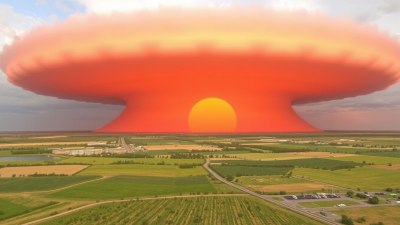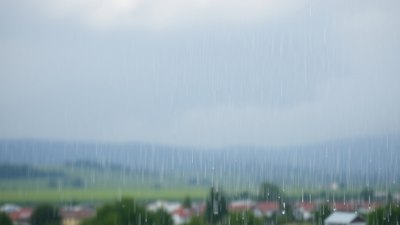When It Was Too Hot to Talk So We Just Existed
Explore the profound silence and shared existence during unbearably hot days in this introspective narrative.

Image created with Flux Schnell
The oppressive heat had settled in like a heavy, unyielding blanket, pressing down on every inch of the world around us. It was that kind of heat where words seemed unnecessary, even burdensome, slipping away before they could form coherently. When it was too hot to talk, we simply existed—a silent communion beneath the scorching sun.
Such days possess a unique atmosphere, one that challenges the usual rhythm of conversation and interaction. The usual chatter pauses, replaced by the collective stillness of beings conserving energy, presence, and breath. Each movement became deliberate, languid, and minimal, as if the air held a tangible weight that forbade frivolity.
Our skin, damp with perspiration, clung to the fabric of clothing, while the sun beat relentlessly overhead. Shadows offered refuge, but even they seemed to carry the heat’s memory, radiating warmth back into the skin. The world contracted to a smaller scale; grand gestures were reduced, actions slowed to conserve strength, and thoughts turned inward.
The heat created a boundary, not just physical but psychological. It was an invisible barrier that muted voices and slowed time. Instead of lively conversations, there were quiet exchanges of glances or the soft rustling of leaves in a faint breeze. We took refuge in this silent existence, connected by the shared experience of enduring the heat's intensity rather than words or stories.
Beneath this oppressive warmth, our surroundings transformed. The vibrant colors of the day dulled under the haze; the sky seemed stretched and heavy, a pale blue that threatened to burn. Trees stood as still sentinels, their leaves glistening with sweat under the relentless sun. Even the air shimmered, distorting the landscape like a mirage, blurring outlines and creating a fluid world.
In these moments, time itself felt suspended. Hours slipped by unnoticed, folded into each other by the heat's unyielding grip. The clock hands moved, but the sense of urgency evaporated, replaced by the essential need to simply be. Talking felt extraneous, sometimes impossible, as the mouth dried, and the throat tightened with the sun's fervor.
Inside our minds, thoughts spiraled gently without direction. The heat slowed cognition, not dulling it but rearranging it, like a slow dance without rhythm. Memories floated to the surface—fragments of cooler days, conversations held in shade or rain, laughter that once filled the air but now seemed distant. These recollections mingled with the present silence, creating a tapestry of existence that needed no explanation.
Movement became a rare event. When necessary, it was deliberate and slow—an unhurried reach for water, the shift of shade from one spot to another. Each motion was measured against the radiant heat, ensuring minimal exertion. At times, the only sounds were the faint rustle of a breeze or the soft hum of distant insects seeking shelter, a soundtrack accompanying our quiet endurance.
We found solace in simple sensory experiences: the cool touch of water against sun-warmed skin, the relief of stepping into shadow, the soft brushing of fabric soaked with sweat. Each sensation was amplified by the stillness, a reminder that despite the heat’s intensity, life persisted in subtle ways.
Social dynamics changed in the heat’s grip. Community interactions paused or took new forms; instead of gathering to talk, people sat apart but connected, offering company through silent presence rather than dialogue. This shared stillness fostered a unique kind of intimacy—one based on understanding without words, a mutual acknowledgment of endurance.
In the absence of conversation, the gaze became a powerful tool. Eyes met and held meaning, conveying empathy, fatigue, or quiet amusement. A smile could brighten the heat-heavy atmosphere, a shared look could affirm solidarity. When the tongue faltered under the sun’s weight, these wordless exchanges sustained connection.
The night brought no immediate relief, for the heat lingered, wrapping the world in a warm embrace that resisted coolness. Sleep came fitfully, with sweat-soaked sheets and restless limbs, the mind still half-ensnared by the day's languor. Yet, even in this discomfort, there was a strange beauty—an acceptance of the body's limits and a surrender to nature’s rhythms.
Over time, the experience reshaped our awareness. We learned to listen closely, not just to sounds but to silence; to recognize presence without the need for speech; to appreciate moments that required nothing but being. The heat taught patience and simplicity, urging a focus on the immediate rather than the complex or abstract.
When the rains eventually came, breaking the heat’s hold, conversation resumed with renewed vigor. Words flowed like cooling streams, rehydrating the parched social fabric. Yet, the memory of those silent days remained—a reminder that sometimes, existence itself suffices when conditions render speech too arduous.
Reflecting on this, it’s clear that communication transcends verbal exchange. Sometimes the deepest connections form in shared stillness, in acknowledging the presence of others without uttering a single word. When it was too hot to talk, we just existed—together, quietly enduring, and profoundly connected.
This experience underscores the power of nonverbal presence and the resilience of human bonds even in discomfort. It is a testament to adaptability and the silent strength found within communal persistence. The heat, while oppressive, gifted a rare pause, a chance to slow down and simply be in the company of others.
Ultimately, these moments invite a broader contemplation of how silence can be meaningful and how enduring hardship together fosters subtle yet powerful forms of connection. They remind us that existence need not be loud to be significant and that sometimes, the most profound interactions are those that defy articulation.
Through the heat’s relentless embrace, we discovered a new language—the language of quiet endurance, shared presence, and unspoken understanding. It was a language born not of words but of being, a testament to the human spirit’s ability to adapt and find communion even under the harshest conditions.
Thus, when it was too hot to talk, our silence spoke volumes, and our existence carried the weight and warmth of shared experience, forever etched in the texture of those parched, sun-drenched days.











